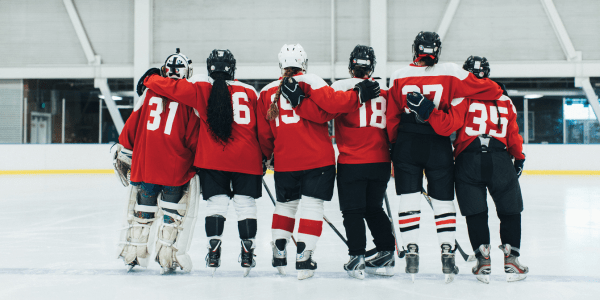Your Thought Process After a Mistake
To take it a step further, what are your thoughts if your mistake occurs late in a game, allowing the opposing team to score and win the game?
Every player makes mistakes, and every player responds to mistakes differently.
Your response to a mistake impacts the next play, the next shift, and the next game.
For example, let’s say you fail to clear a pass midway through the third period of a tie game. The turnover in your defensive end leads to a goal by the opposing team. Now, what you do next is critical.
Every player will have an initial negative emotional response (disappointment, anger, frustration, etc.). In other words, no one is happy after making a mistake, especially when the error impacts the score.
If you dwell on the mistake, your negative emotions will either fester or escalate. You may find it difficult to let go of the error after the game and become overly self-critical.
As a result, your confidence takes a hit. Lower confidence may cause you to have a subpar performance in your next game. In this instance, you compound the problem by your refusal to let go and move on.
The optimal response is to reset when you return to the bench, calm your emotions, and refocus for your next shift. A mental reset helps you minimize further mistakes and return to playing at a high level.
After the game, you can evaluate your performance and process your mistakes. Sometimes, negative emotions may flare up, notably if your error contributed to a loss. That’s okay. Give yourself time to work through your emotions.
When you Assess your Performance…
Identify what led up to the mistake and what you could have done differently.
If you need to, create a plan or mental strategy to prevent similar mistakes in future games. This positive response is empowering and helps you maintain high confidence.
Philadelphia Flyers center Noah Cates is in his second full NHL season. In an early season game against the Carolina Hurricanes, Cates gave up the puck in Philadelphia’s defensive end, leading to Carolina scoring the game-winning goal.
As Carolina celebrated, Cates was visibly upset with himself but, after the game, was committed to learning from his mistake.
CATES: “I think I’ll learn from this game and from this league until I’m done with it. It’s such a great game; it’s such a game where it’s situational. There’s never a similar play or a similar game. Situational play is huge. We talk about it so much. Just learning from things like that.”
Cates views every experience on the ice as an opportunity to learn and grow as a player.
CATES: “We’ve just got to learn. I think that’s the biggest thing, learning from everything — learning from your mistakes, the wins, the losses, everything — is huge in this league.”
The key to processing mistakes is to have a “Student of the Game” mentality….
Being a student of the game means viewing every play, both the good and the bad, as an opportunity to learn.
When you are committed to excellence, you will use each game to improve and grow.
When you do feel negative emotions after making a mistake during a game, calm your emotions by managing your reaction. “I’m not perfect–mistakes happen in this game.”
Before your next shift, refocus on what to do on your next shift. Shed the monkey on your back.
When you arrive home, after the game, you can assess your performance, identify the cause of the mistake, and think how to improve in the next practice.
Related Articles on Hockey Mental Game:
- Teaching Hockey Players to Let Go of Mistakes
- How to Cope Better With Mistakes
- Overcoming Mistakes in Hockey
*Subscribe to The Sports Psychology Podcast on iTunes
*Subscribe to The Sports Psychology Podcast on Spotify
Mental Coaching Programs for Hockey
Our mental game coaching programs for hockey players helps athletes improve confidence, concentration, let go of errors quickly, and stay composed during crunch-time. Read more about sports psychology for hockey players at Peaksports.com
Please contact me by phone at 888-742-7225 or by filling out the webform below to learn more about our personal mental training programs for hockey players or teams:

Leave a Reply